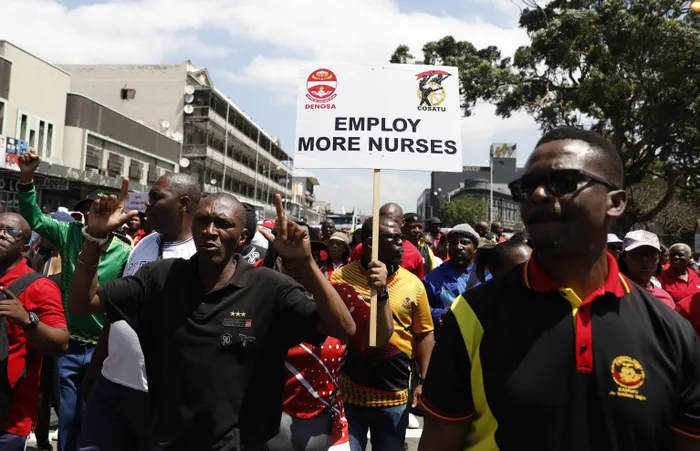
The Congress of South African Trade Unions (Cosatu) marched in Durban on Tuesday as part of activities to mark the International Day for Decent Work.
Image: Doctor Ngcobo / Independent Newspapers
The Congress of South African Trade Unions (Cosatu) has called on employers to explore other cost-saving strategies in the running of their businesses and ensure that retrenchment is the last resort.
The federation made the call as it marched in Durban on Tuesday as part of activities to mark the International Day for Decent Work.
Cosatu was joined by its affiliates including the South African Democratic Teachers Union.
In a memorandum delivered at the Durban City Hall, the trade union federation said South Africans are under severe strain.
“We join hands with our comrades across the world in the fight for decent work and human dignity.
“We are here to express our anger and disappointment at the lack of care, support, and protection of workers by both the government and employers, who continue to put profits and elite interests above the needs of workers and the poor.
“Workers in South Africa continue to face major challenges, including mass unemployment, deep poverty, and extreme inequality. Their living conditions are worsened by low wages, rising food prices, unaffordable transport costs, and soaring utility tariffs.
“We raise our voices today to demand action from the government of national unity and the business community. We call on businesses to demonstrate patriotism by using the country’s wealth and productive capacity to advance a better life for all, not just for a privileged few."
The federation said the government and businesses have failed to create sufficient jobs to absorb the growing labour force, and even worse, they are actively destroying existing jobs through mass retrenchments.
According to the latest Quarterly Labour Force Survey, nearly 800,000 people lost their jobs in just three months due to retrenchments, company closures, liquidations, and expired contracts. Over 4 million are unemployed as a result of these retrenchments and have not been re-employed.
“Employers routinely abuse Section 189 processes, reducing consultations to a mere formality while pushing predetermined retrenchments. At the same time, both government and businesses are lobbying for amendments to labour laws to make it easier to dismiss workers.
The federation demanded the implementation of all possible measures by the government and employers to avoid retrenchments and protect existing jobs.
It called for the government and employers to respect and honour all collective agreements, and that salaries and wages for workers must be paid timeously by government, municipalities, and employers. It also called for employers to report and reduce pay differentials between the highest and lowest-paid workers, and to close the gender pay gap.
It called for the end of austerity budgets and the obsession with debt reduction at the expense of development.
“Insource security and cleaning services at the hospitals and other government institutions; an immediate plan to protect these workers who are exploited by independent companies in these institutions must be developed,” it said.
The union further stated that, “South Africa is the most unequal country in the world, with over 63% of the population living below the upper-middle-income poverty line. Food insecurity, unaffordable transport, and rising municipal tariffs continue to push families into destitution. An urgent government-led intervention to address the cost-of-living crisis is needed.”
The Federation of Unions of South Africa (FEDUSA) reiterated its call for decent work for all, as a cornerstone of social justice, inclusive economic growth, and development.
“Decent work is an important human right as it represents the path towards equality, dignity, and empowerment for millions of workers across South Africa and the world. It consists of access to employment, fair wages, workplace health and safety, social protection, respect for labour rights, opportunities for personal development, and equal treatment for all regardless of gender, age, race, or background,” it said.
DA MP and national spokesperson Karabo Khakhau said that South Africa needs an empowerment model that genuinely opens doors for all, lifts people out of poverty, and builds sustainable employment.
Related Topics: